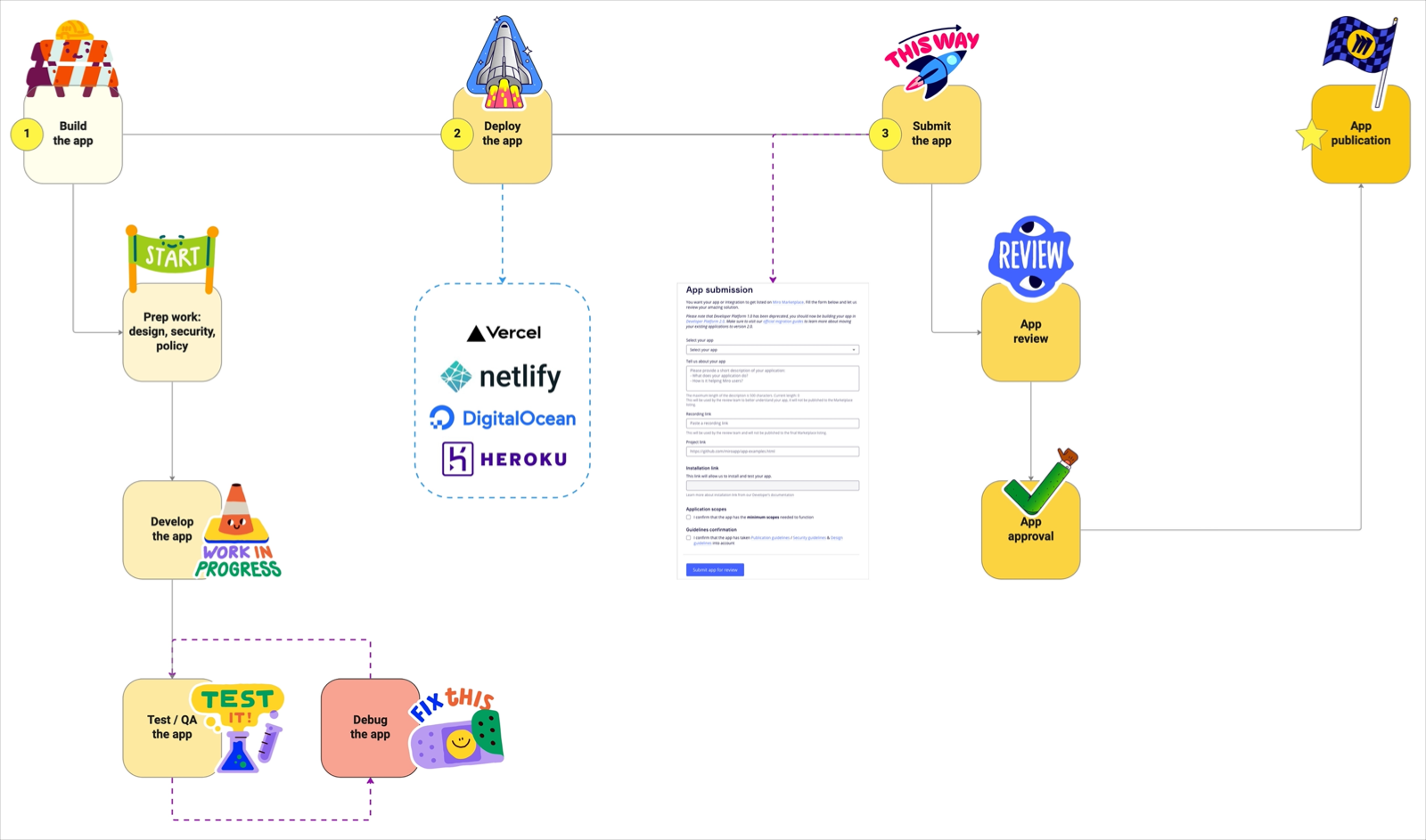Submit your app for review
We are on a mission to empower teams by providing them with apps and integrations that enrich collaboration through a self-serving ecosystem.
To ensure that, we opened the Miro Marketplace to developers who are willing to change the world of collaboration with us. Submit your apps for review and publication to the Miro Marketplace to enhance the experience of millions of users.
What apps are the best fit for the Miro Marketplace?
We welcome apps and integrations that enrich collaboration for our key audience.
This means that your app addresses user pain points and boosts user experience in the following use cases:
- Facilitating or participating in workshops and remote meetings.
- Leading or following Agile rituals and workflows.
- Performing research and design methods.
- Developing software.
- Providing Miro users a better core user experience.
If you're keen to learn how our users solve their everyday collaboration tasks with Miro:
- Follow our blog and Online Community, where customers and partners share stories of their projects, frameworks, and successes.
- Check the developer community page for updates, and join us on Discord to discuss with fellow developers and exchange ideas.
How do I get my app published?
Publishing an app means making it available for installation on the Miro Marketplace, which is available to millions of Miro users.
Here are the steps to get your app published to the Miro Marketplace:

Figure 1. The Miro app submission process flow: 1. Build 2. Deploy 3. Submit.
Step 1: build the app
Prep work
Before you start building your app, get familiar with the following documents and processes:
- Check our design guidelines, and ensure your app follows them.
We want to deliver the best experience to users, and we expect developers to share our passion for great UX.- Go to Mirotone to access and use a range of UI components that will make your app shine and fit in Miro boards seamlessly.
- If your app uses SVG files, make sure the SVGs are optimized before uploading them.
- Check our security guidelines, and ensure your implementation follows them.
Besides providing a delightful UX, your app needs to handle data securely, and it should not be vulnerable to known exploits. - Review our developer policy.
Develop the app
Start building your app. You can start from scratch, or you can customize one of our sample apps to make the first steps shorter and easier.
- To get started with a Web SDK app development process, check Build your first Hello, World app.
- To get started with the REST API app development process, check the REST API quick start.
- You can also leverage our Node.js API client.
Test and debug the app
Test your app to identify and address bugs.
Rinse and repeat.
Step 2: deploy the app
Deploy your app to a hosting service that makes the app publicly available.
You can host your app on Digital Ocean (with Dokku), Firebase, Glitch, Heroku, Render, Vercel, and many other alternatives.
Step 3: submit the app
Submission
At this point, you're ready to submit your app: fill out this form and send it to us.
Review
The Miro Platform team reviews your app.
When you submit an app for review, the Miro Platform team opens a Jira ticket to track the review process. They add you to the ticket as the reporter.
All communication about the app review flows through the Jira ticket. This gives you a clear place to check the review progress, to contact the reviewers to ask questions, and to receive feedback from them.
The Miro Platform team may contact you to request additional information, to report a bug, and to inform you about the subsequent steps.
This process may take a couple of weeks: bear with us, you're almost there.
Approval
Once your app is approved, it's ready to be published to the Miro Marketplace.
Now it's time to check the Miro Marketplace listing guidelines to make sure your app listing on the Marketplace stands out and appeals to Miro users.
When your app is listed on the Miro Marketplace, it's available to millions of users.
Migrating apps from v. 1.0 to v. 2.0
If you need to migrate your app to upgrade it to use the REST API or the Web SDK version 2.0, check our documentation about migrating from v. 1.0 to v. 2.0.